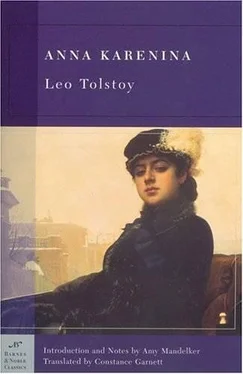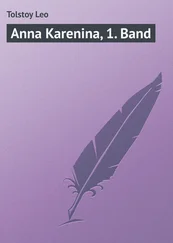"You know her, no doubt?"
"I think I do. Or perhaps not… I really am not sure," Vronsky answered heedlessly, with a vague recollection of something stiff and tedious evoked by the name Karenina.
"But Alexei Alexandrovich, my celebrated brother-in-law, you surely must know. All the world knows him."
"I know him by reputation and by sight. I know that he's clever, learned, religious somewhat… But you know that's not… not in my line," said Vronsky in English.
"Yes, he's a very remarkable man; rather a conservative, but a very nice man," observed Stepan Arkadyevich, "a very nice man."
"Oh, well, so much the better for him," said Vronsky smiling. "Oh, you've come," he said, addressing a tall old footman of his mother's standing at the door; "come here."
Besides the charm Oblonsky had in general for everyone, Vronsky had felt of late specially drawn to him by the fact that in his imagination he was associated with Kitty.
"Well, what do you say? Shall we give a supper on Sunday for the diva?" he said to him with a smile, taking his arm.
"Of course. I'm collecting subscriptions. Oh, did you make the acquaintance of my friend Levin?" asked Stepan Arkadyevich.
"Yes; but he left rather early."
"He's a capital fellow," pursued Oblonsky. "Isn't he?"
"I don't know why it is," responded Vronsky, "in all Moscow people- present company of course excepted," he put in jestingly, "there's something uncompromising. They are all on the defensive, lose their tempers, as though they all want to make one feel something…"
"Yes, that's true, it's so," said Stepan Arkadyevich, laughing cheerfully.
"Will the train be in soon?" Vronsky asked a railway official.
"The train's signaled," answered the man.
The approach of the train was more and more evident by the preparatory bustle in the station, the rush of porters, the movement of gendarmes and attendants, and crowding people meeting the train. Through the frosty vapor could be seen workmen in short sheepskins and soft felt boots crossing the rails of the curving line. The hiss of the boiler could be heard on the distant rails, and the rumble of something heavy.
"No," said Stepan Arkadyevich, who felt a great inclination to tell Vronsky of Levin's intentions in regard to Kitty. "No, you haven't got a true impression of Levin. He's a very nervous man, and is sometimes out of humor, it's true, but then he is often very charming. He has such a true, honest nature, and a heart of gold. But yesterday there were special reasons," pursued Stepan Arkadyevich, with a meaning smile, totally oblivious of the genuine sympathy he had felt the day before for his friend, and feeling the same sympathy now, only for Vronsky. "Yes, there were reasons why he could not help being either particularly happy or particularly unhappy."
Vronsky stood still and asked directly: "How so? Do you mean he proposed to your belle-soeur yesterday?"
"Maybe," said Stepan Arkadyevich. "I fancied something of the sort yesterday. Yes, if he went away early, and was out of humor too, such must be the case… He's been so long in love, and I'm very sorry for him."
"So that's it!… I should imagine, though, she might reckon on a better match," said Vronsky, setting his chest straight and walking about again, "though I don't know him, of course," he added. "Yes, that is a hateful position! That's why most fellows prefer to have to do with the Claras. If you don't succeed with them it only proves that you've not enough cash, but in this case one's dignity is in the balance. But here's the train."
The engine had already whistled in the distance. A few instants later the platform began to shake, and, with puffs of steam hanging low in the air from the frost, the engine rolled up, with the rod of the middle wheel rhythmically moving up and down, and the bowed, muffled figure of the engine driver covered with hoarfrost. Behind the tender, setting the platform more and more slowly and more powerfully shaking, came the luggage van with a dog whining in it. At last the passenger carriages rolled in, quivering before coming to a standstill.
A smart guard jumped out, giving a whistle, and after him one by one the impatient passengers began to get down: an officer of the guards, holding himself erect, and looking severely about him; a nimble young merchant with a bag, smiling gaily; a peasant with a sack over his shoulder.
Vronsky, standing beside Oblonsky, watched the carriages and the passengers, totally oblivious of his mother. What he had just heard about Kitty excited and delighted him. Unconsciously he straightened his chest, and his eyes flashed. He felt himself a conqueror.
"Countess Vronskaia is in that compartment," said the smart guard, going up to Vronsky.
The guard's words roused him, and forced him to think of his mother and his approaching meeting with her. He did not in his heart respect his mother, and, without acknowledging it to himself, he did not love her, though in accordance with the ideas of the set in which he lived, and with his own upbringing, he could not have conceived of any behavior to his mother not in the highest degree respectful and obedient, and the more externally obedient and respectful, the less in his heart he respected and loved her.
Vronsky followed the guard to the carriage, and at the door of the compartment he stopped short to make room for a lady who was getting out.
With the habitual feeling of a man of the world, from one glance at this lady's appearance Vronsky classified her as belonging to the best society. He begged pardon, and was getting into the carriage, but felt he must glance at her once more; not because she was very beautiful, not because of that elegance and modest grace which were apparent in her whole figure, but because in the expression of her charming face, as she passed close by him, there was something peculiarly caressing and soft. As he looked round, she too turned her head. Her shining gray eyes, that looked dark because of her thick lashes, rested with friendly attention on his face, as though she were recognizing him, and then promptly turned away to the passing crowd, as though seeking someone. In that brief look Vronsky had time to notice the suppressed animation which played over her face, and flitted between the brilliant eyes and the faint smile that curved her red lips. It was as though her nature were so brimming over with something that, against her will, it showed itself now in the flash of her eyes, and now in her smile. Deliberately she shrouded the light in her eyes, but it shone against her will in her faintly perceptible smile.
Vronsky stepped into the carriage. His mother, a dried-up old lady with black eyes and ringlets, screwed up her eyes, scanning her son, and smiled slightly with her thin lips. Getting up from the seat and handing her maid a handbag, she gave her little wrinkled hand to her son to kiss, and lifting his head from her hand, kissed him on the cheek.
"You got my telegram? Quite well? Thank God."
"You had a good journey?" said her son, sitting down beside her, and involuntarily listening to a woman's voice outside the door. He knew it was the voice of the lady he had met at the door.
"All the same I don't agree with you," said the lady's voice.
"It's the Peterburg view, madame."
"Not Peterburg, but simply feminine," she responded.
"Well, well, allow me to kiss your hand."
"Good-by, Ivan Petrovich. And would you see if my brother is here, and send him to me?" said the lady in the doorway, and stepped back again into the compartment.
"Well, have you found your brother?" said Countess Vronskaia, addressing the lady.
Vronsky understood now that this was Madame Karenina.
"Your brother is here," he said, standing up. "Excuse me, I did not know you, and, indeed, our acquaintance was so slight," said Vronsky bowing, "that no doubt you do not remember me."
Читать дальше












